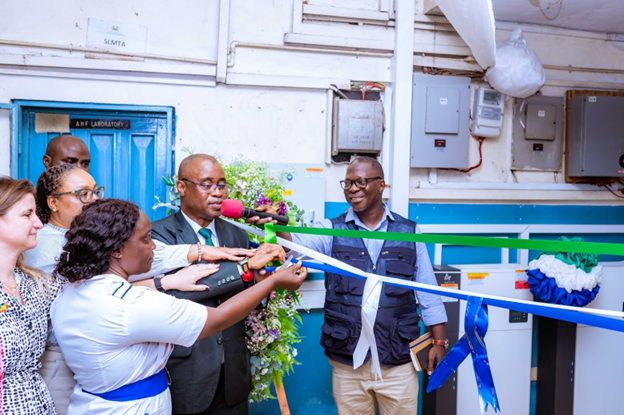In a landmark initiative aimed at enhancing healthcare access, Sierra Leone has made significant strides by introducing around-the-clock electricity to 25 community health clinics. The implementation of solar photovoltaic (PV) systems was formally celebrated on November 14, 2024, at the Jenner Wright Clinic. Dr. Charles Senesie, the Deputy Minister of Health, led the ceremony, marking the completion of Phase 2 of the Sierra Leone Healthcare Electrification Project.
This ambitious venture is a collaborative effort involving Sustainable Energy for All (SEforALL), the Sierra Leone Ministry of Health, and the UK Government. As the project progresses into its third phase, the next goal is to expand solar power access to 11 additional hospitals across the country—a move that will significantly uplift healthcare services, particularly in rural and underserved areas.
Dr. Senesie emphasized the transformative power of solar energy, stating, “The transformation of these 25 health facilities using the power of the sun will forever change how healthcare is delivered. This initiative not only enhances health service delivery but also demonstrates our commitment to a sustainable and green future.” His sentiment underscores the dual benefits of advancing healthcare and promoting environmental sustainability.
Prior to the solar installations, the plight of many clinics was stark—18 out of 25 had no reliable source of electricity, often relying on diesel generators or occasionally facing power shortages. The newfound solar energy now enables consistent power, enhancing the provision of primary care services. The project also addresses national sustainability goals by reducing dependence on diesel fuel, thereby decreasing energy costs and environmental impact. For instance, Phase 1 of the project, which electrified six key hospitals, resulted in a dramatic reduction in fuel use—averaging between 60% to 99%.
One of the highlights from the event came from the Medical Superintendent of the Torwama Community Health Centre, who shared the profound impact of solar energy on maternal and infant care: “Mothers and babies can now receive critical care 24/7, supported by dependable, sustainable energy,” he said, showcasing how essential this power supply is for emergency services.
The launch of Phase 3 aims to electrify major facilities, including Connaught, Lakka, Port Loko, Makeni, and Kenema Government Hospitals. Dr. Mustapha Kabba, Deputy Chief Medical Officer at Connaught Hospital, expressed optimism about the positive shift in healthcare dynamics, reflecting on his past experiences with unreliable power supply at the facility. “I look forward to coming back in a few months and switching off the generator as we transition to solar energy,” he remarked with enthusiasm.
Since its inception in October 2022, the Sierra Leone Healthcare Electrification Project has aimed to tackle the significant challenges posed by the lack of reliable electricity in health facilities, a concern identified in numerous needs assessments. Once fully operational, the project will have installed 4.3 MWp of solar power across 43 health facilities.
Ngozi Beckley-Lines, SEforALL’s Country Manager for Sierra Leone, articulated the project’s extensive reach, stating, “This project is absolutely transforming lives, not only for patients but also for healthcare workers by creating a safer and more reliable environment for quality care around the clock.”
With its ambitious goals and positive outlook for the future, the Sierra Leone Healthcare Electrification Project is a prime example of how renewable energy can be harnessed to improve healthcare outcomes and support sustainable development in Africa.
Join the conversation about this inspirational journey towards sustainable healthcare with #PoweringHealthcare and #PoweringLivesSL on social media!
Tags: #SierraLeone #Healthcare #Sustainability #WorldNews #Tourism #Environment



